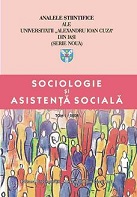DESISTANCE AND VICTIM PROTECTION IN ROMANIA: COLLABORATION BETWEEN PROBATION AND PRISON FROM THE PERSPECTIVE OF THE PROGRAMME ‘REDUCING THE RISK OF RELAPSE’
DESISTANCE AND VICTIM PROTECTION IN ROMANIA:
COLLABORATION BETWEEN PROBATION AND PRISON FROM
THE PERSPECTIVE OF THE PROGRAMME ‘REDUCING
THE RISK OF RELAPSE’
Author(s): Maria Marinela SanduSubject(s): Social Sciences, Sociology
Published by: Editura Universităţii »Alexandru Ioan Cuza« din Iaşi
Keywords: Desistance; Probation; Prison; ‘Reducing the Risk of Relapse’ programme; Victim’s protection;
Summary/Abstract: Criminologically, the psychosocial and educational perspectives on the person who commits acts of aggressiveness, including sexual abuse, are based on several theoretical models of intervention, which are included in the bio-pathological, psychological and sociocultural perspectives. This is the very premise of the assisted desistance as a succession of stages developed within the criminal trial, and taking risk management as the fundamental principle applied in the custodial and probation system. Firstly, this article starts from a case study conducted in the Romanian probation system, which is presented at the “Fifth International Conference Multidisciplinary Perspectives in the Quasi-Coercive Treatment of Offenders. Probation as a field of study and research: From person to society” (2016). Secondly, it reflects the collaboration between prison and probation in the primary and secondary desistance using the programme ‘Reducing the Risk of Relapse’ (RRR) after prison, which uses the complementary ‘risk, needs and responsivity’ (RNR) model with the “Good Life Model” (GLM) based on combining the principle of individual responsiveness with that of social responsibility. Our arguments are – in the sense of highlighting the importance of individualizing the sanction – focusing on the contextualized narrative identity, from secondary desistance to ensure the continuity of the post-sentence rehabilitation and the protection of the crime victim.
- Issue Year: 14/2021
- Issue No: 1
- Page Range: 45-61
- Page Count: 17
- Language: English

